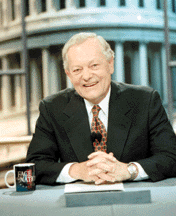Face the future
Chancellor Ferrari appoints Bob Schieffer ’59 — anchor and moderator of CBS News’ “Face the Nation” — as chair of the Commission on the Future of TCU.
Face the future
Chancellor Ferrari appoints Bob Schieffer ’59 — anchor and moderator of CBS News’ “Face the Nation” — as chair of the Commission on the Future of TCU.
 Bob Schieffer ’59 wanted to be a baseball player.
Bob Schieffer ’59 wanted to be a baseball player.
His mother wanted him to be a doctor.
The two compromised when Schieffer arrived on campus in the fall of 1955. He took comparative anatomy and tried out for the TCU baseball team.
Forty-four years later, from his Face the Nation office in Washington, D.C., broadcast journalism’s most experienced Washington reporter laughs.
“I must say in all honesty that it was my experience in comparative anatomy that led me to journalism,” said the 62-year-old Schieffer. “After a semester of that, I knew that medicine was not the direction, for the sake of the patient, that I should be going.” And as for baseball, Schieffer made the team as its catcher.
“I actually started the first few games,” he said, “but then I got hurt and my baseball career came to an end. Of course, there are very few people who will remember my baseball career.”
As much as Schieffer likes to look back on his TCU days, in the coming months he will be looking far ahead for alma mater. The newsman who has covered the nation’s capital for 29 years suddenly has a new beat for the next year — as chair of the Commission on the Future of TCU.
The goal? To determine the University’s course for the coming century.
“Too often, universities spend their time building buildings and raising more money to do only that,” Schieffer said. “This is a commission that looks beyond that. What is it TCU ought to be and what do we want it to be?
“The University has just finished a major campaign. Now, we need to pause for a minute and think about what the University is and where is it going. I hope and envision this commission to be something where we’ll question every assumption and take nothing for granted.”
The commission — composed of as many as 400 members — will officially kick off its activities in November, said associate vice chancellor Larry Lauer, the commission’s director, and will issue its final report in late 2000.
“Are we large enough? How should we price our tuition? What should be our areas of academic distinction?” Lauer asked. “This is the time to identify our strengths, understand our weaknesses . . . and grasp our opportunities.”
In the field of communications alone, one of TCU’s largest undergraduate programs, Schieffer can already imagine some possibilities.
“I often tell people that when my children were small, they’d say, ‘Dad, did you want to be a televison reporter when you grew up?’ And I would tell them that we didn’t have televison when I was a boy. We didn’t have television in Fort Worth until I was in the eighth grade. There are going to be jobs out there in 10 years that we don’t even know about and things to do we can’t imagine.
“We’re at a point in history where we could have another golden age. If you look back in history, when great advances in human thought were made, it was when remarkable people happened to be in one place at one time. With today’s communication tools, you don’t have to be in the same place with people to exchange thoughts. How do we take advantage of that at TCU?”
And when that question and others are asked at universities, Schieffer concluded, all of society benefits.
“The university ought to be a place where you explore in an objective way. The only way to get at the truth is to search for it in a way that you’re willing to accept the answers you find. That’s why universities are so important. They are the one institution in society that has the liberty to just explore everything.” Then Schieffer smiles.
“The golfer Lee Trevino once said, ‘Someone has to win these golf tournaments, why shouldn’t it be me?’ Well, there are going to be some great universities tomorrow; why shouldn’t one of them be TCU?”

Your comments are welcome
Comments
Related Reading:
Campus News: Alma Matters
TCU’s Library Celebrates a Century
Uncover hidden gems of the academic hub, from vintage mechanics to modern masterpieces.
Campus News: Alma Matters
Infographic: TCU’s Shared Values
The Board of Trustees adopted four TCU values after considering input from more than 4,000 constituents.